Leadership and Management Theory and Practice: A Case Study Report
VerifiedAdded on 2023/01/05
|10
|2449
|49
Report
AI Summary
This report delves into leadership and management theories, exploring their practical application through a case study of Jeff Bezos, the CEO of Amazon. The report begins by defining leadership and management, highlighting the distinction between inspiring individuals and directing operations. It then examines various leadership styles, including trait, behavioral, situational, contingency, transformational, and transactional approaches, and how Bezos utilizes these within Amazon. The report also covers different management styles, such as autocratic, democratic, and laissez-faire, analyzing their relevance to Amazon's organizational structure and culture. Furthermore, it discusses the roles of managers and leaders, emphasizing the importance of effective resource allocation, risk management, vision creation, and decision-making. The analysis concludes that both managers and leaders play crucial roles in strategy execution, employee performance, and achieving organizational goals, with Bezos's leadership style being instrumental in Amazon's success. The report references various academic sources to support its findings and offers a comprehensive overview of leadership and management principles in a real-world business context.
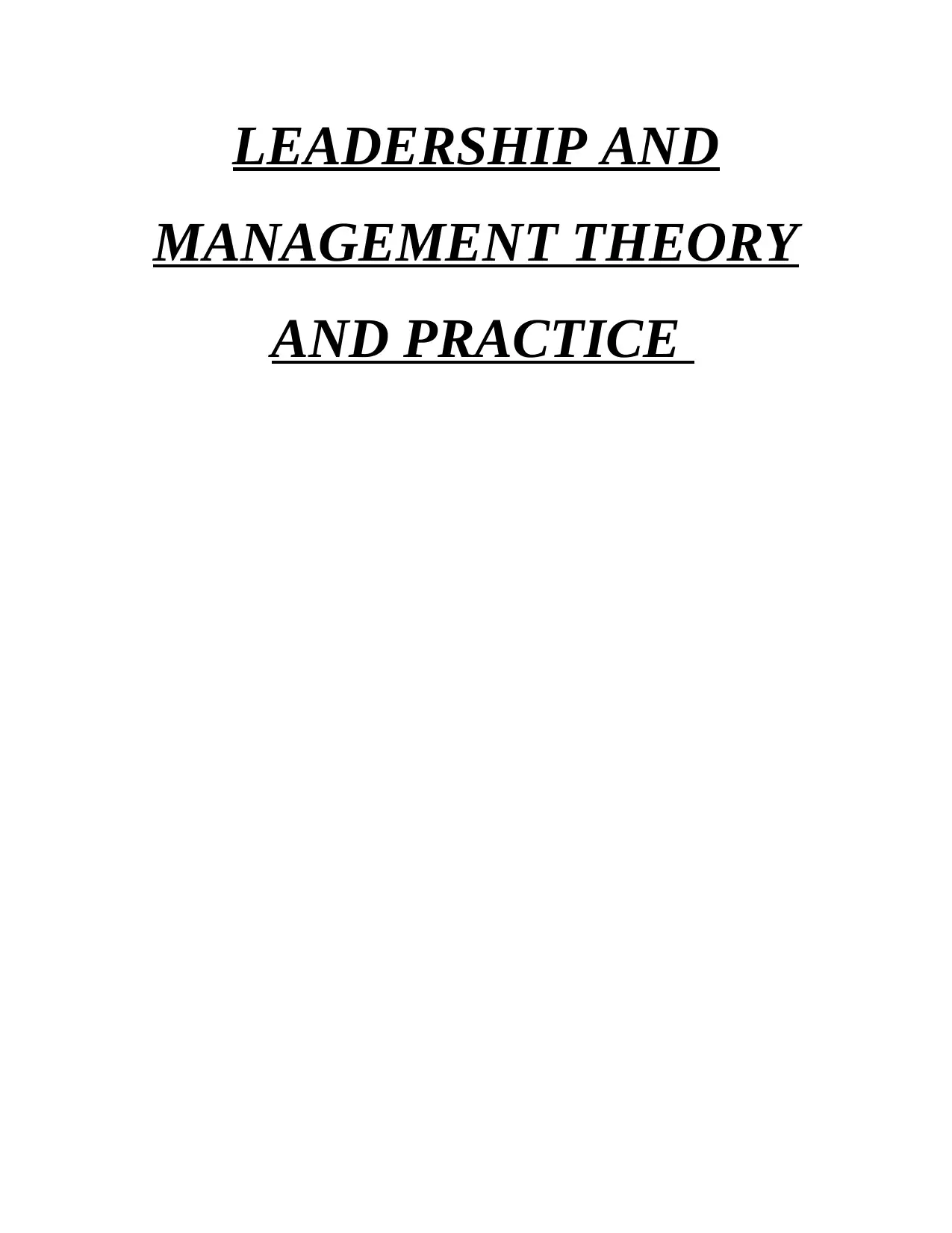
LEADERSHIP AND
MANAGEMENT THEORY
AND PRACTICE
MANAGEMENT THEORY
AND PRACTICE
Paraphrase This Document
Need a fresh take? Get an instant paraphrase of this document with our AI Paraphraser
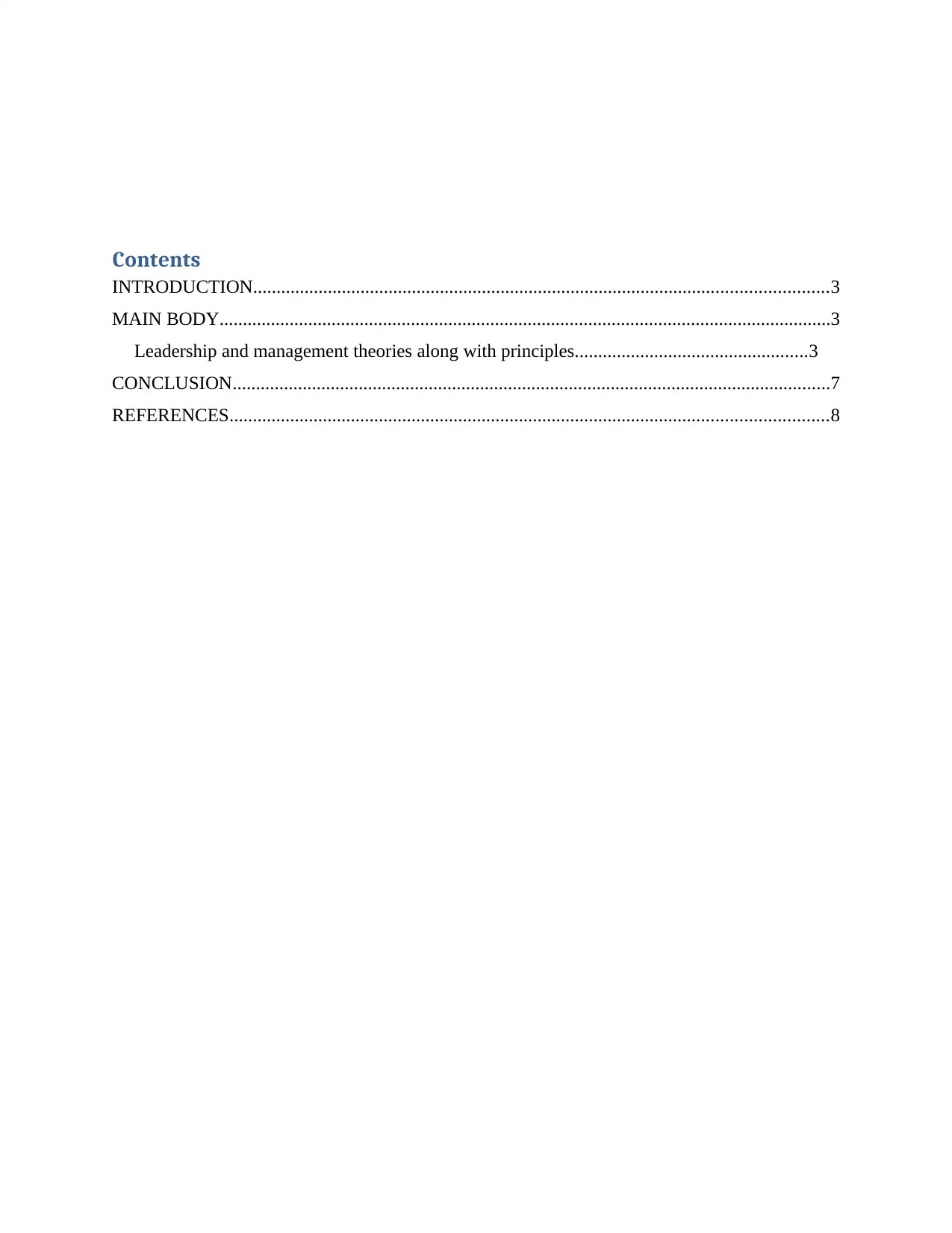
Contents
INTRODUCTION...........................................................................................................................3
MAIN BODY...................................................................................................................................3
Leadership and management theories along with principles..................................................3
CONCLUSION................................................................................................................................7
REFERENCES................................................................................................................................8
INTRODUCTION...........................................................................................................................3
MAIN BODY...................................................................................................................................3
Leadership and management theories along with principles..................................................3
CONCLUSION................................................................................................................................7
REFERENCES................................................................................................................................8
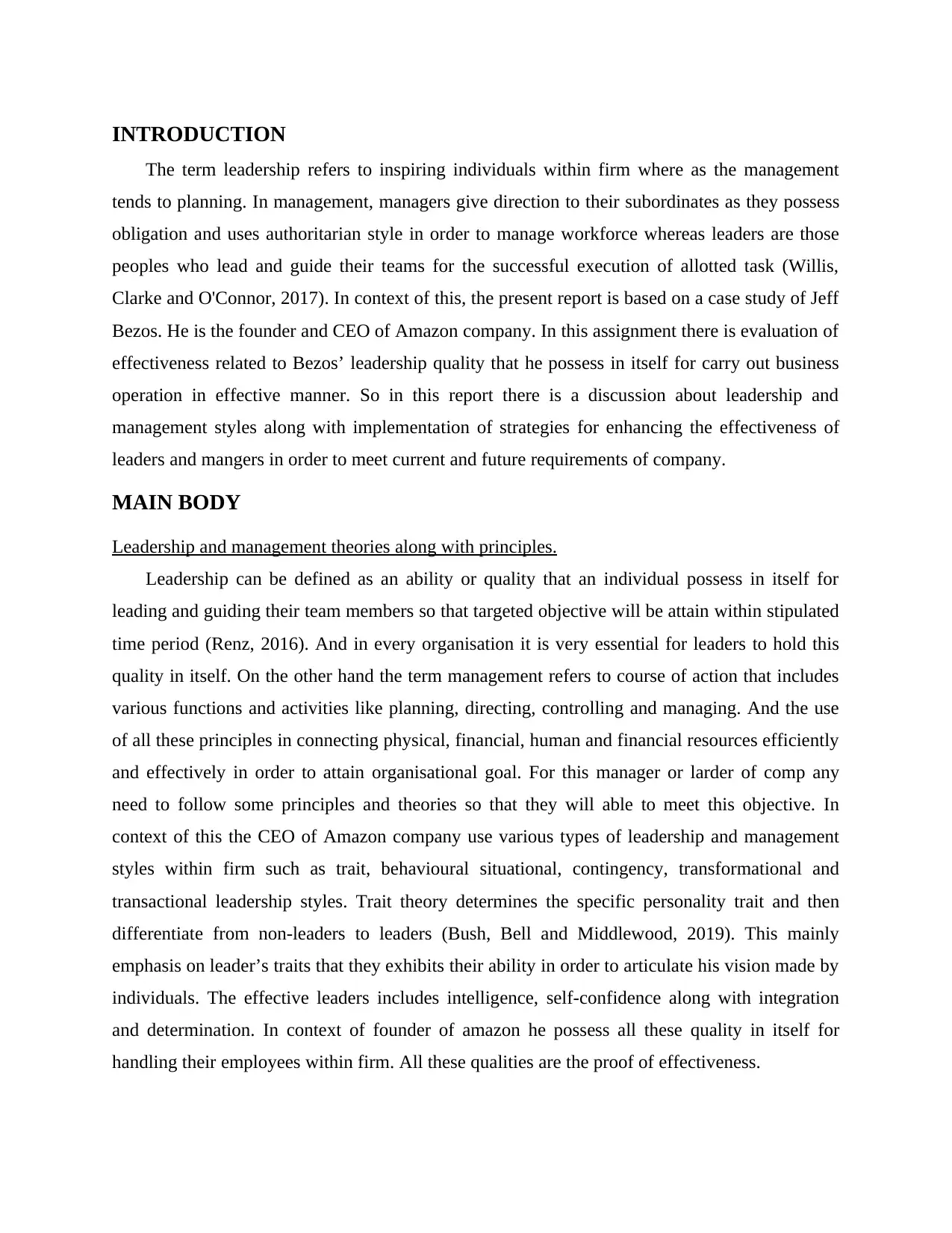
INTRODUCTION
The term leadership refers to inspiring individuals within firm where as the management
tends to planning. In management, managers give direction to their subordinates as they possess
obligation and uses authoritarian style in order to manage workforce whereas leaders are those
peoples who lead and guide their teams for the successful execution of allotted task (Willis,
Clarke and O'Connor, 2017). In context of this, the present report is based on a case study of Jeff
Bezos. He is the founder and CEO of Amazon company. In this assignment there is evaluation of
effectiveness related to Bezos’ leadership quality that he possess in itself for carry out business
operation in effective manner. So in this report there is a discussion about leadership and
management styles along with implementation of strategies for enhancing the effectiveness of
leaders and mangers in order to meet current and future requirements of company.
MAIN BODY
Leadership and management theories along with principles.
Leadership can be defined as an ability or quality that an individual possess in itself for
leading and guiding their team members so that targeted objective will be attain within stipulated
time period (Renz, 2016). And in every organisation it is very essential for leaders to hold this
quality in itself. On the other hand the term management refers to course of action that includes
various functions and activities like planning, directing, controlling and managing. And the use
of all these principles in connecting physical, financial, human and financial resources efficiently
and effectively in order to attain organisational goal. For this manager or larder of comp any
need to follow some principles and theories so that they will able to meet this objective. In
context of this the CEO of Amazon company use various types of leadership and management
styles within firm such as trait, behavioural situational, contingency, transformational and
transactional leadership styles. Trait theory determines the specific personality trait and then
differentiate from non-leaders to leaders (Bush, Bell and Middlewood, 2019). This mainly
emphasis on leader’s traits that they exhibits their ability in order to articulate his vision made by
individuals. The effective leaders includes intelligence, self-confidence along with integration
and determination. In context of founder of amazon he possess all these quality in itself for
handling their employees within firm. All these qualities are the proof of effectiveness.
The term leadership refers to inspiring individuals within firm where as the management
tends to planning. In management, managers give direction to their subordinates as they possess
obligation and uses authoritarian style in order to manage workforce whereas leaders are those
peoples who lead and guide their teams for the successful execution of allotted task (Willis,
Clarke and O'Connor, 2017). In context of this, the present report is based on a case study of Jeff
Bezos. He is the founder and CEO of Amazon company. In this assignment there is evaluation of
effectiveness related to Bezos’ leadership quality that he possess in itself for carry out business
operation in effective manner. So in this report there is a discussion about leadership and
management styles along with implementation of strategies for enhancing the effectiveness of
leaders and mangers in order to meet current and future requirements of company.
MAIN BODY
Leadership and management theories along with principles.
Leadership can be defined as an ability or quality that an individual possess in itself for
leading and guiding their team members so that targeted objective will be attain within stipulated
time period (Renz, 2016). And in every organisation it is very essential for leaders to hold this
quality in itself. On the other hand the term management refers to course of action that includes
various functions and activities like planning, directing, controlling and managing. And the use
of all these principles in connecting physical, financial, human and financial resources efficiently
and effectively in order to attain organisational goal. For this manager or larder of comp any
need to follow some principles and theories so that they will able to meet this objective. In
context of this the CEO of Amazon company use various types of leadership and management
styles within firm such as trait, behavioural situational, contingency, transformational and
transactional leadership styles. Trait theory determines the specific personality trait and then
differentiate from non-leaders to leaders (Bush, Bell and Middlewood, 2019). This mainly
emphasis on leader’s traits that they exhibits their ability in order to articulate his vision made by
individuals. The effective leaders includes intelligence, self-confidence along with integration
and determination. In context of founder of amazon he possess all these quality in itself for
handling their employees within firm. All these qualities are the proof of effectiveness.
⊘ This is a preview!⊘
Do you want full access?
Subscribe today to unlock all pages.

Trusted by 1+ million students worldwide
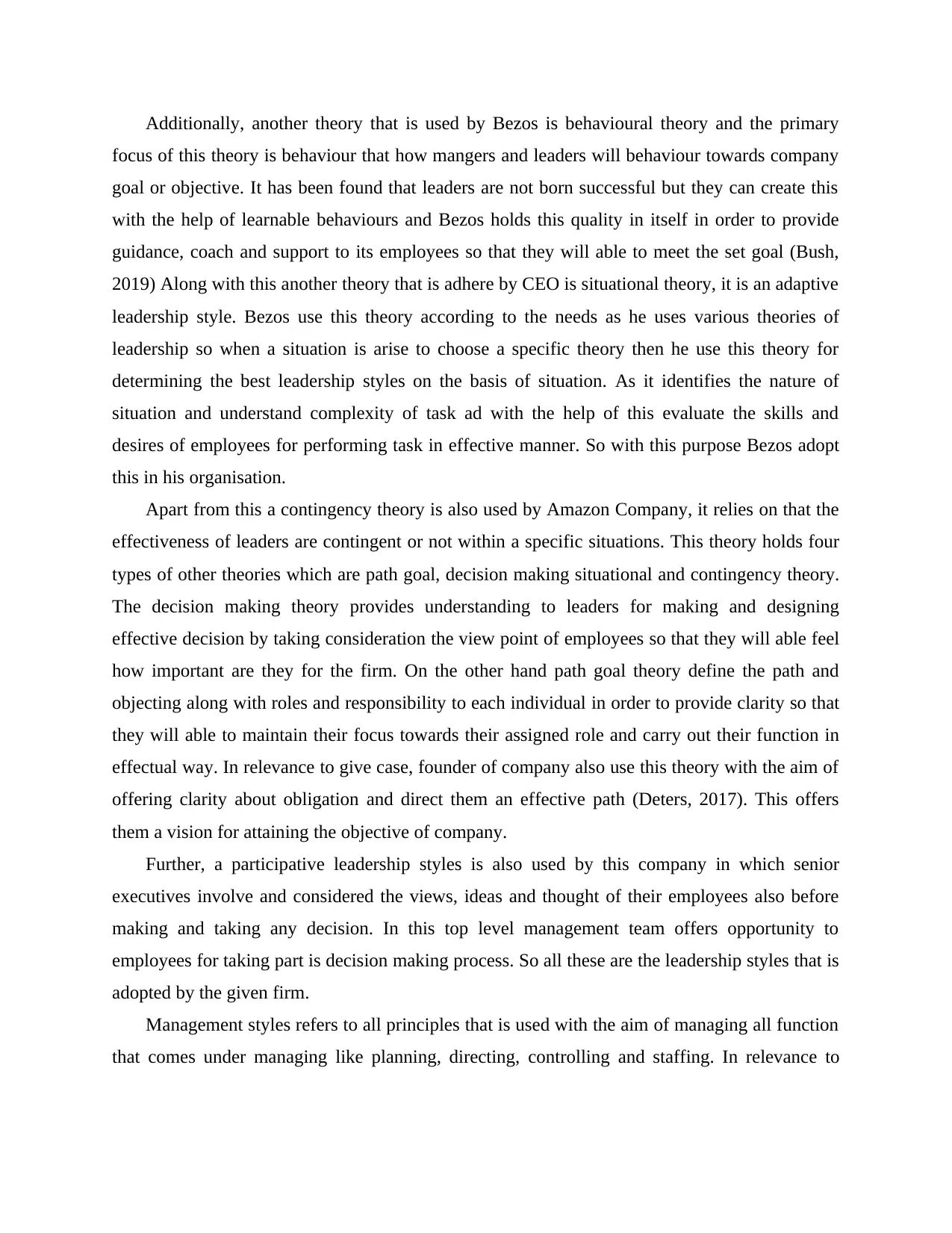
Additionally, another theory that is used by Bezos is behavioural theory and the primary
focus of this theory is behaviour that how mangers and leaders will behaviour towards company
goal or objective. It has been found that leaders are not born successful but they can create this
with the help of learnable behaviours and Bezos holds this quality in itself in order to provide
guidance, coach and support to its employees so that they will able to meet the set goal (Bush,
2019) Along with this another theory that is adhere by CEO is situational theory, it is an adaptive
leadership style. Bezos use this theory according to the needs as he uses various theories of
leadership so when a situation is arise to choose a specific theory then he use this theory for
determining the best leadership styles on the basis of situation. As it identifies the nature of
situation and understand complexity of task ad with the help of this evaluate the skills and
desires of employees for performing task in effective manner. So with this purpose Bezos adopt
this in his organisation.
Apart from this a contingency theory is also used by Amazon Company, it relies on that the
effectiveness of leaders are contingent or not within a specific situations. This theory holds four
types of other theories which are path goal, decision making situational and contingency theory.
The decision making theory provides understanding to leaders for making and designing
effective decision by taking consideration the view point of employees so that they will able feel
how important are they for the firm. On the other hand path goal theory define the path and
objecting along with roles and responsibility to each individual in order to provide clarity so that
they will able to maintain their focus towards their assigned role and carry out their function in
effectual way. In relevance to give case, founder of company also use this theory with the aim of
offering clarity about obligation and direct them an effective path (Deters, 2017). This offers
them a vision for attaining the objective of company.
Further, a participative leadership styles is also used by this company in which senior
executives involve and considered the views, ideas and thought of their employees also before
making and taking any decision. In this top level management team offers opportunity to
employees for taking part is decision making process. So all these are the leadership styles that is
adopted by the given firm.
Management styles refers to all principles that is used with the aim of managing all function
that comes under managing like planning, directing, controlling and staffing. In relevance to
focus of this theory is behaviour that how mangers and leaders will behaviour towards company
goal or objective. It has been found that leaders are not born successful but they can create this
with the help of learnable behaviours and Bezos holds this quality in itself in order to provide
guidance, coach and support to its employees so that they will able to meet the set goal (Bush,
2019) Along with this another theory that is adhere by CEO is situational theory, it is an adaptive
leadership style. Bezos use this theory according to the needs as he uses various theories of
leadership so when a situation is arise to choose a specific theory then he use this theory for
determining the best leadership styles on the basis of situation. As it identifies the nature of
situation and understand complexity of task ad with the help of this evaluate the skills and
desires of employees for performing task in effective manner. So with this purpose Bezos adopt
this in his organisation.
Apart from this a contingency theory is also used by Amazon Company, it relies on that the
effectiveness of leaders are contingent or not within a specific situations. This theory holds four
types of other theories which are path goal, decision making situational and contingency theory.
The decision making theory provides understanding to leaders for making and designing
effective decision by taking consideration the view point of employees so that they will able feel
how important are they for the firm. On the other hand path goal theory define the path and
objecting along with roles and responsibility to each individual in order to provide clarity so that
they will able to maintain their focus towards their assigned role and carry out their function in
effectual way. In relevance to give case, founder of company also use this theory with the aim of
offering clarity about obligation and direct them an effective path (Deters, 2017). This offers
them a vision for attaining the objective of company.
Further, a participative leadership styles is also used by this company in which senior
executives involve and considered the views, ideas and thought of their employees also before
making and taking any decision. In this top level management team offers opportunity to
employees for taking part is decision making process. So all these are the leadership styles that is
adopted by the given firm.
Management styles refers to all principles that is used with the aim of managing all function
that comes under managing like planning, directing, controlling and staffing. In relevance to
Paraphrase This Document
Need a fresh take? Get an instant paraphrase of this document with our AI Paraphraser
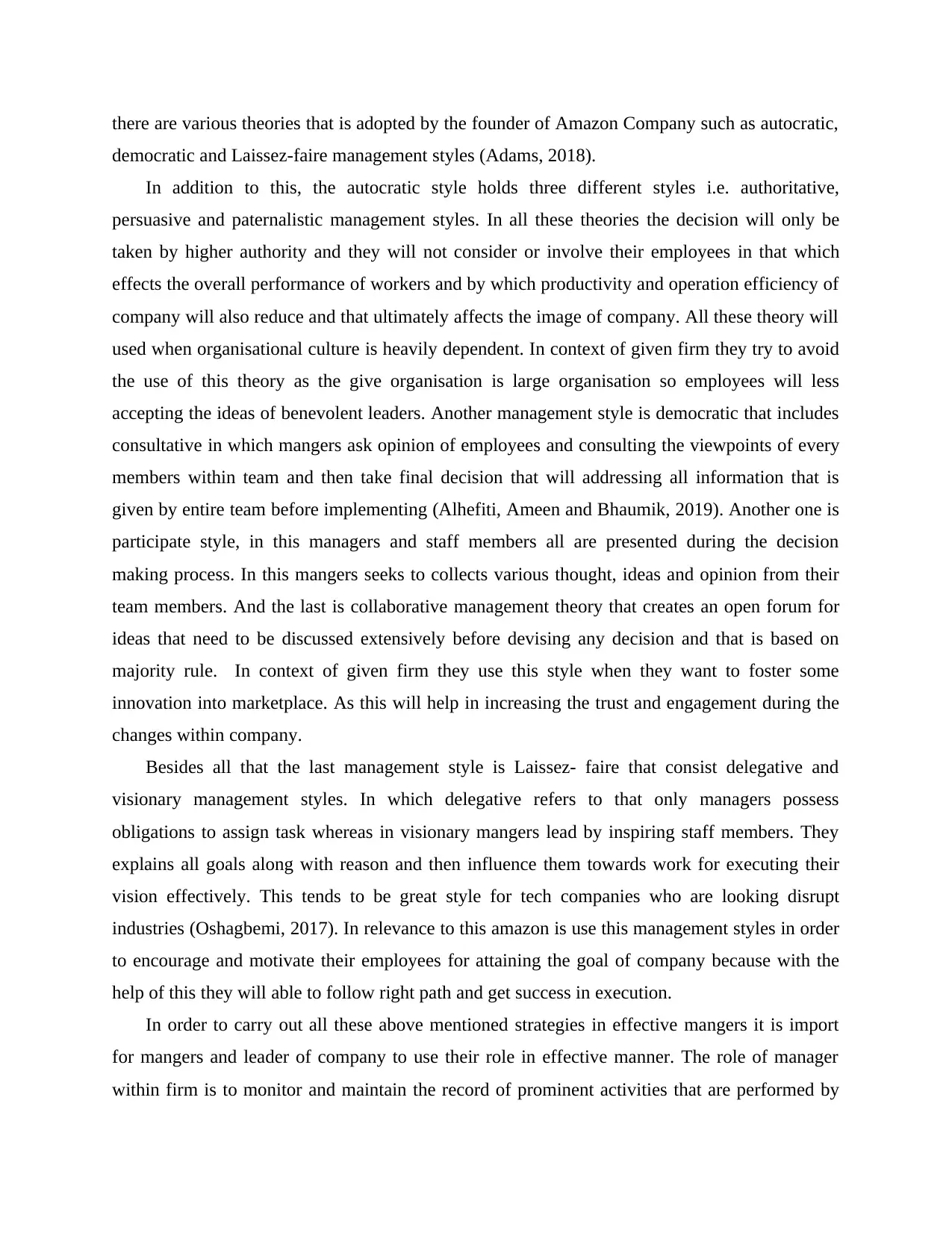
there are various theories that is adopted by the founder of Amazon Company such as autocratic,
democratic and Laissez-faire management styles (Adams, 2018).
In addition to this, the autocratic style holds three different styles i.e. authoritative,
persuasive and paternalistic management styles. In all these theories the decision will only be
taken by higher authority and they will not consider or involve their employees in that which
effects the overall performance of workers and by which productivity and operation efficiency of
company will also reduce and that ultimately affects the image of company. All these theory will
used when organisational culture is heavily dependent. In context of given firm they try to avoid
the use of this theory as the give organisation is large organisation so employees will less
accepting the ideas of benevolent leaders. Another management style is democratic that includes
consultative in which mangers ask opinion of employees and consulting the viewpoints of every
members within team and then take final decision that will addressing all information that is
given by entire team before implementing (Alhefiti, Ameen and Bhaumik, 2019). Another one is
participate style, in this managers and staff members all are presented during the decision
making process. In this mangers seeks to collects various thought, ideas and opinion from their
team members. And the last is collaborative management theory that creates an open forum for
ideas that need to be discussed extensively before devising any decision and that is based on
majority rule. In context of given firm they use this style when they want to foster some
innovation into marketplace. As this will help in increasing the trust and engagement during the
changes within company.
Besides all that the last management style is Laissez- faire that consist delegative and
visionary management styles. In which delegative refers to that only managers possess
obligations to assign task whereas in visionary mangers lead by inspiring staff members. They
explains all goals along with reason and then influence them towards work for executing their
vision effectively. This tends to be great style for tech companies who are looking disrupt
industries (Oshagbemi, 2017). In relevance to this amazon is use this management styles in order
to encourage and motivate their employees for attaining the goal of company because with the
help of this they will able to follow right path and get success in execution.
In order to carry out all these above mentioned strategies in effective mangers it is import
for mangers and leader of company to use their role in effective manner. The role of manager
within firm is to monitor and maintain the record of prominent activities that are performed by
democratic and Laissez-faire management styles (Adams, 2018).
In addition to this, the autocratic style holds three different styles i.e. authoritative,
persuasive and paternalistic management styles. In all these theories the decision will only be
taken by higher authority and they will not consider or involve their employees in that which
effects the overall performance of workers and by which productivity and operation efficiency of
company will also reduce and that ultimately affects the image of company. All these theory will
used when organisational culture is heavily dependent. In context of given firm they try to avoid
the use of this theory as the give organisation is large organisation so employees will less
accepting the ideas of benevolent leaders. Another management style is democratic that includes
consultative in which mangers ask opinion of employees and consulting the viewpoints of every
members within team and then take final decision that will addressing all information that is
given by entire team before implementing (Alhefiti, Ameen and Bhaumik, 2019). Another one is
participate style, in this managers and staff members all are presented during the decision
making process. In this mangers seeks to collects various thought, ideas and opinion from their
team members. And the last is collaborative management theory that creates an open forum for
ideas that need to be discussed extensively before devising any decision and that is based on
majority rule. In context of given firm they use this style when they want to foster some
innovation into marketplace. As this will help in increasing the trust and engagement during the
changes within company.
Besides all that the last management style is Laissez- faire that consist delegative and
visionary management styles. In which delegative refers to that only managers possess
obligations to assign task whereas in visionary mangers lead by inspiring staff members. They
explains all goals along with reason and then influence them towards work for executing their
vision effectively. This tends to be great style for tech companies who are looking disrupt
industries (Oshagbemi, 2017). In relevance to this amazon is use this management styles in order
to encourage and motivate their employees for attaining the goal of company because with the
help of this they will able to follow right path and get success in execution.
In order to carry out all these above mentioned strategies in effective mangers it is import
for mangers and leader of company to use their role in effective manner. The role of manager
within firm is to monitor and maintain the record of prominent activities that are performed by
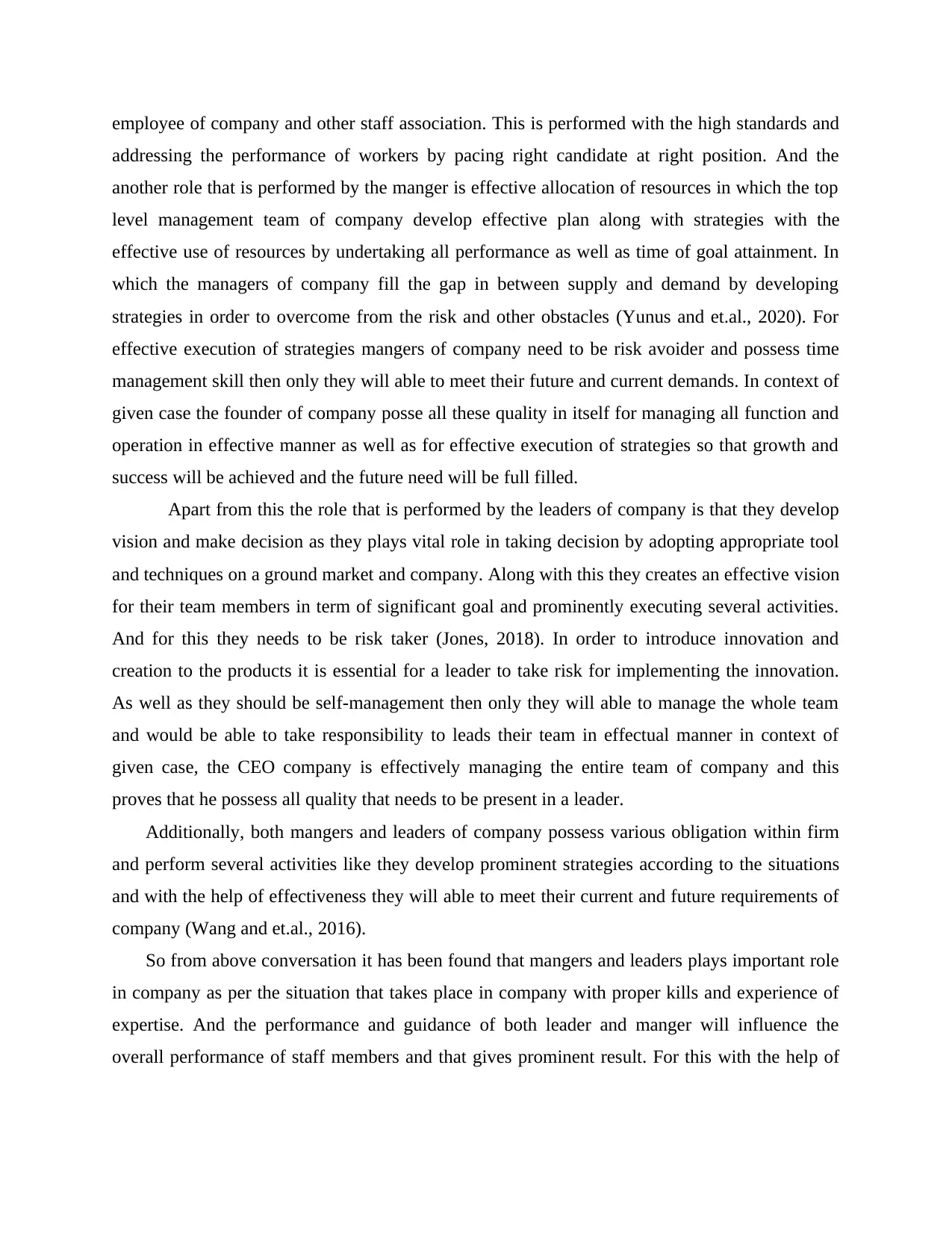
employee of company and other staff association. This is performed with the high standards and
addressing the performance of workers by pacing right candidate at right position. And the
another role that is performed by the manger is effective allocation of resources in which the top
level management team of company develop effective plan along with strategies with the
effective use of resources by undertaking all performance as well as time of goal attainment. In
which the managers of company fill the gap in between supply and demand by developing
strategies in order to overcome from the risk and other obstacles (Yunus and et.al., 2020). For
effective execution of strategies mangers of company need to be risk avoider and possess time
management skill then only they will able to meet their future and current demands. In context of
given case the founder of company posse all these quality in itself for managing all function and
operation in effective manner as well as for effective execution of strategies so that growth and
success will be achieved and the future need will be full filled.
Apart from this the role that is performed by the leaders of company is that they develop
vision and make decision as they plays vital role in taking decision by adopting appropriate tool
and techniques on a ground market and company. Along with this they creates an effective vision
for their team members in term of significant goal and prominently executing several activities.
And for this they needs to be risk taker (Jones, 2018). In order to introduce innovation and
creation to the products it is essential for a leader to take risk for implementing the innovation.
As well as they should be self-management then only they will able to manage the whole team
and would be able to take responsibility to leads their team in effectual manner in context of
given case, the CEO company is effectively managing the entire team of company and this
proves that he possess all quality that needs to be present in a leader.
Additionally, both mangers and leaders of company possess various obligation within firm
and perform several activities like they develop prominent strategies according to the situations
and with the help of effectiveness they will able to meet their current and future requirements of
company (Wang and et.al., 2016).
So from above conversation it has been found that mangers and leaders plays important role
in company as per the situation that takes place in company with proper kills and experience of
expertise. And the performance and guidance of both leader and manger will influence the
overall performance of staff members and that gives prominent result. For this with the help of
addressing the performance of workers by pacing right candidate at right position. And the
another role that is performed by the manger is effective allocation of resources in which the top
level management team of company develop effective plan along with strategies with the
effective use of resources by undertaking all performance as well as time of goal attainment. In
which the managers of company fill the gap in between supply and demand by developing
strategies in order to overcome from the risk and other obstacles (Yunus and et.al., 2020). For
effective execution of strategies mangers of company need to be risk avoider and possess time
management skill then only they will able to meet their future and current demands. In context of
given case the founder of company posse all these quality in itself for managing all function and
operation in effective manner as well as for effective execution of strategies so that growth and
success will be achieved and the future need will be full filled.
Apart from this the role that is performed by the leaders of company is that they develop
vision and make decision as they plays vital role in taking decision by adopting appropriate tool
and techniques on a ground market and company. Along with this they creates an effective vision
for their team members in term of significant goal and prominently executing several activities.
And for this they needs to be risk taker (Jones, 2018). In order to introduce innovation and
creation to the products it is essential for a leader to take risk for implementing the innovation.
As well as they should be self-management then only they will able to manage the whole team
and would be able to take responsibility to leads their team in effectual manner in context of
given case, the CEO company is effectively managing the entire team of company and this
proves that he possess all quality that needs to be present in a leader.
Additionally, both mangers and leaders of company possess various obligation within firm
and perform several activities like they develop prominent strategies according to the situations
and with the help of effectiveness they will able to meet their current and future requirements of
company (Wang and et.al., 2016).
So from above conversation it has been found that mangers and leaders plays important role
in company as per the situation that takes place in company with proper kills and experience of
expertise. And the performance and guidance of both leader and manger will influence the
overall performance of staff members and that gives prominent result. For this with the help of
⊘ This is a preview!⊘
Do you want full access?
Subscribe today to unlock all pages.

Trusted by 1+ million students worldwide
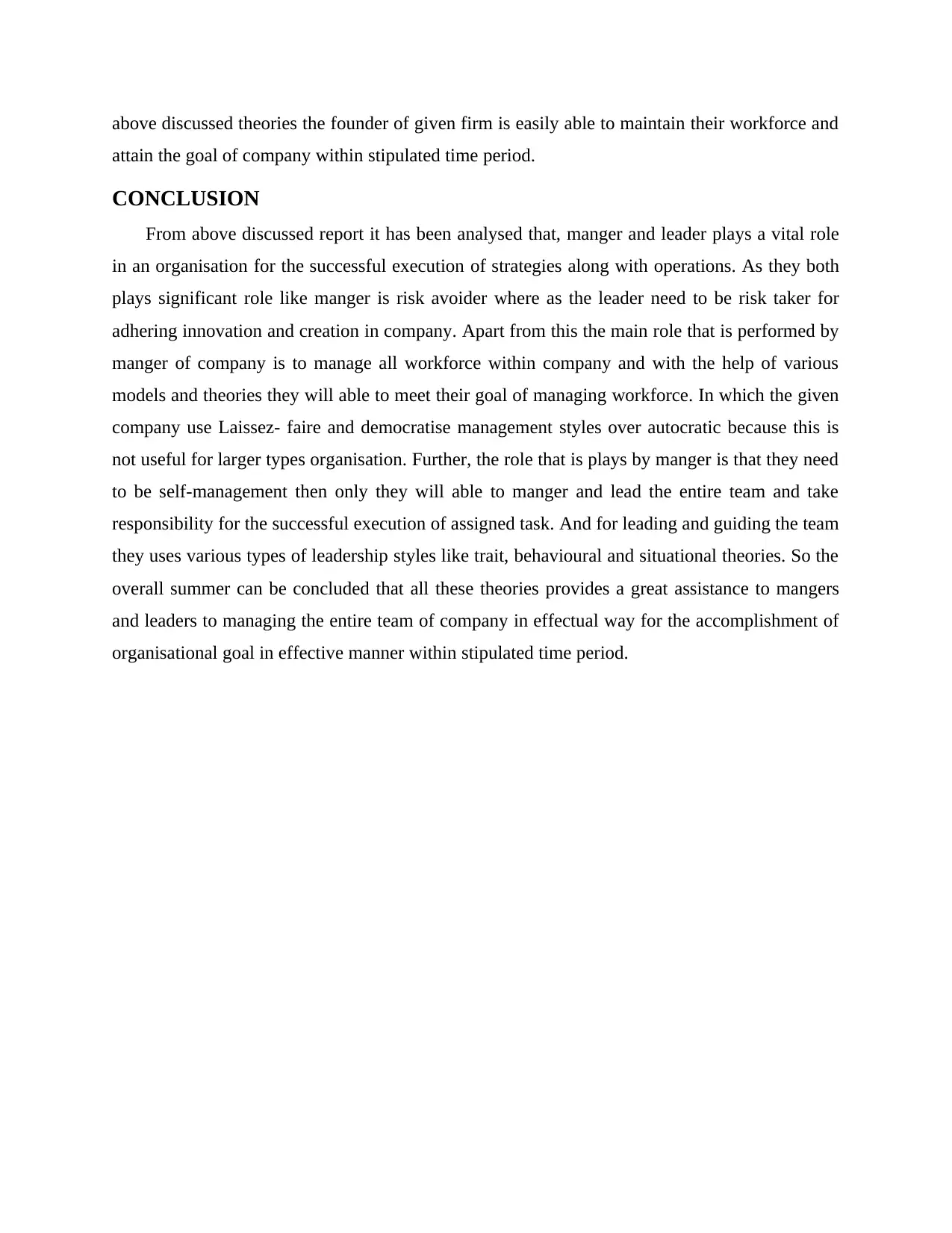
above discussed theories the founder of given firm is easily able to maintain their workforce and
attain the goal of company within stipulated time period.
CONCLUSION
From above discussed report it has been analysed that, manger and leader plays a vital role
in an organisation for the successful execution of strategies along with operations. As they both
plays significant role like manger is risk avoider where as the leader need to be risk taker for
adhering innovation and creation in company. Apart from this the main role that is performed by
manger of company is to manage all workforce within company and with the help of various
models and theories they will able to meet their goal of managing workforce. In which the given
company use Laissez- faire and democratise management styles over autocratic because this is
not useful for larger types organisation. Further, the role that is plays by manger is that they need
to be self-management then only they will able to manger and lead the entire team and take
responsibility for the successful execution of assigned task. And for leading and guiding the team
they uses various types of leadership styles like trait, behavioural and situational theories. So the
overall summer can be concluded that all these theories provides a great assistance to mangers
and leaders to managing the entire team of company in effectual way for the accomplishment of
organisational goal in effective manner within stipulated time period.
attain the goal of company within stipulated time period.
CONCLUSION
From above discussed report it has been analysed that, manger and leader plays a vital role
in an organisation for the successful execution of strategies along with operations. As they both
plays significant role like manger is risk avoider where as the leader need to be risk taker for
adhering innovation and creation in company. Apart from this the main role that is performed by
manger of company is to manage all workforce within company and with the help of various
models and theories they will able to meet their goal of managing workforce. In which the given
company use Laissez- faire and democratise management styles over autocratic because this is
not useful for larger types organisation. Further, the role that is plays by manger is that they need
to be self-management then only they will able to manger and lead the entire team and take
responsibility for the successful execution of assigned task. And for leading and guiding the team
they uses various types of leadership styles like trait, behavioural and situational theories. So the
overall summer can be concluded that all these theories provides a great assistance to mangers
and leaders to managing the entire team of company in effectual way for the accomplishment of
organisational goal in effective manner within stipulated time period.
Paraphrase This Document
Need a fresh take? Get an instant paraphrase of this document with our AI Paraphraser
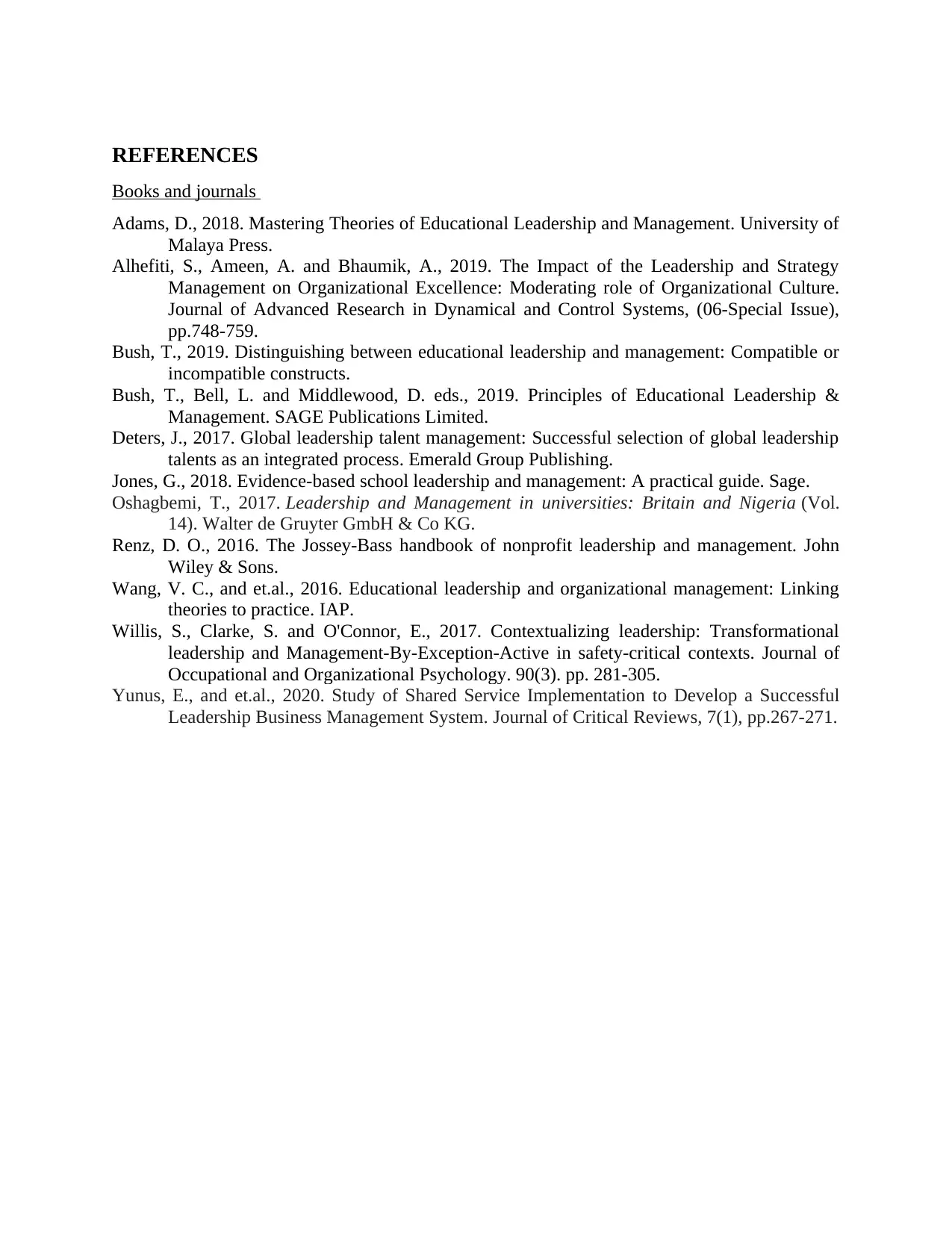
REFERENCES
Books and journals
Adams, D., 2018. Mastering Theories of Educational Leadership and Management. University of
Malaya Press.
Alhefiti, S., Ameen, A. and Bhaumik, A., 2019. The Impact of the Leadership and Strategy
Management on Organizational Excellence: Moderating role of Organizational Culture.
Journal of Advanced Research in Dynamical and Control Systems, (06-Special Issue),
pp.748-759.
Bush, T., 2019. Distinguishing between educational leadership and management: Compatible or
incompatible constructs.
Bush, T., Bell, L. and Middlewood, D. eds., 2019. Principles of Educational Leadership &
Management. SAGE Publications Limited.
Deters, J., 2017. Global leadership talent management: Successful selection of global leadership
talents as an integrated process. Emerald Group Publishing.
Jones, G., 2018. Evidence-based school leadership and management: A practical guide. Sage.
Oshagbemi, T., 2017. Leadership and Management in universities: Britain and Nigeria (Vol.
14). Walter de Gruyter GmbH & Co KG.
Renz, D. O., 2016. The Jossey-Bass handbook of nonprofit leadership and management. John
Wiley & Sons.
Wang, V. C., and et.al., 2016. Educational leadership and organizational management: Linking
theories to practice. IAP.
Willis, S., Clarke, S. and O'Connor, E., 2017. Contextualizing leadership: Transformational
leadership and Management‐By‐Exception‐Active in safety‐critical contexts. Journal of
Occupational and Organizational Psychology. 90(3). pp. 281-305.
Yunus, E., and et.al., 2020. Study of Shared Service Implementation to Develop a Successful
Leadership Business Management System. Journal of Critical Reviews, 7(1), pp.267-271.
Books and journals
Adams, D., 2018. Mastering Theories of Educational Leadership and Management. University of
Malaya Press.
Alhefiti, S., Ameen, A. and Bhaumik, A., 2019. The Impact of the Leadership and Strategy
Management on Organizational Excellence: Moderating role of Organizational Culture.
Journal of Advanced Research in Dynamical and Control Systems, (06-Special Issue),
pp.748-759.
Bush, T., 2019. Distinguishing between educational leadership and management: Compatible or
incompatible constructs.
Bush, T., Bell, L. and Middlewood, D. eds., 2019. Principles of Educational Leadership &
Management. SAGE Publications Limited.
Deters, J., 2017. Global leadership talent management: Successful selection of global leadership
talents as an integrated process. Emerald Group Publishing.
Jones, G., 2018. Evidence-based school leadership and management: A practical guide. Sage.
Oshagbemi, T., 2017. Leadership and Management in universities: Britain and Nigeria (Vol.
14). Walter de Gruyter GmbH & Co KG.
Renz, D. O., 2016. The Jossey-Bass handbook of nonprofit leadership and management. John
Wiley & Sons.
Wang, V. C., and et.al., 2016. Educational leadership and organizational management: Linking
theories to practice. IAP.
Willis, S., Clarke, S. and O'Connor, E., 2017. Contextualizing leadership: Transformational
leadership and Management‐By‐Exception‐Active in safety‐critical contexts. Journal of
Occupational and Organizational Psychology. 90(3). pp. 281-305.
Yunus, E., and et.al., 2020. Study of Shared Service Implementation to Develop a Successful
Leadership Business Management System. Journal of Critical Reviews, 7(1), pp.267-271.

⊘ This is a preview!⊘
Do you want full access?
Subscribe today to unlock all pages.

Trusted by 1+ million students worldwide

1 out of 10
Related Documents
Your All-in-One AI-Powered Toolkit for Academic Success.
+13062052269
info@desklib.com
Available 24*7 on WhatsApp / Email
![[object Object]](/_next/static/media/star-bottom.7253800d.svg)
Unlock your academic potential
Copyright © 2020–2026 A2Z Services. All Rights Reserved. Developed and managed by ZUCOL.





